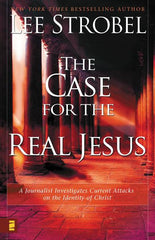Prophecies About Jesus - EVERYTHING You Need to Know (2025)
May 17, 2025

Prophecies About Jesus
An EXTREMELY important evidence supporting Jesus' Divinity was the prophecies that He fulfilled.
It is absolutely astounding when you begin to track down each of these Old Testament prophecies about Jesus, written sometimes hundreds of years before Jesus' earthly ministry.
From what town He would be born to how He would die, from what family He would come from to the type of ministry that He would carry out, the messianic prophecies are dynamic and many are very detailed.
If you would like to skip ahead, here is our Table of Contents:
Overview of Jesus Prophecies
First let me show you a video we did where we talk about some of the prophecies of Jesus. Then we will dig deeper.
Now if you just STOP THERE, you would have a good case that Jesus fulfilled prophecies written about Him hundreds of years before He was born.
HOWEVER, for people who are Jewish scribes or teachers, you may have to dig a bit deeper.
For most people, the above-video will be sufficient.
But if you are talking to a Jew, or someone who studies these prophecies a little deeper, I would recommend reading the rest of this blog post for the FULL and COMPLETE picture.
The Case for the Real Jesus
Much of what we will be talking about was taken from the book The Case For the Real Jesus, by Lee Strobel, in his interview with Dr. Michael Brown.
This is an excellent book to read, especially for the non-scholarly Christian.
Dr. Brown is one of the leading Christian scholars in the world on the prophecies of Jesus.
Dr. Brown's website, which has much more insight and content is at:
Do Jews really care about a Messiah?
Some Jews question whether there is even any credible evidence in the Tanakh (what Christians call the Old Testament) for a coming Messiah.
Well, as Rabbi Aryeh Kaplan has contended, belief in the coming of the Messiah has always been a fundamental part of Judaism.
(Jewish Philosopher) Maimonides (who lived from around AD 1138 to 1204) counts the belief in the Messiah as one of the 13 cardinal principles of Judaism.
As noted in Case For the Real Jesus, Maimonides, whose writings are foundational to Orthodox Judaism, said in the 12th century, "I firmly believe, in complete faith, in the coming of the Messiah, and although he may tarry, I daily wait for his coming."
For more information on Maimonides, check out this article by the Encyclopedia Brittanica, on his life:
https://www.britannica.com/biography/Moses-Maimonides
So the coming of the Messiah is a concept that is repeated again and again throughout the length and breadth of Jewish literature.
The BIG question is whether Jesus of Nazareth is the one who fulfilled these ancient prophecies.
The Greek word for Messiah is "Christos" or Christ.
IF YOU ENJOY LEARNING TO DEFEND YOUR CHRISTIAN FAITH, CLICK THE LINK TO CHECK OUT THE FIRST EVER "APOLOGETICS BOARD GAME".
Jesus' Virginal Birth
Some question Jesus' virginal birth and claim that the Old Testament does NOT even say that the Messiah would be born virginally.
In the septuagint translation of Isaiah 7:14, Isaiah uses the Hebrew word 'almah,' which means a "young woman" would give birth, and the Septuagint makes her virginity more explicit by using the Greek word "parthenos," which literally means 'virgin', and this was a couple hundred years before Jesus was born.
The Bible is the only book in the world that has precise, specific predictions that were made hundreds of years in advance and that were literally fulfilled.
That would mean that the Bible has credentials that are absent from the Koran of Islam, the Upanishads and Bhagavad Gita of Vedanta Hinduism, and the Book of Mormon.
As Dr. Michael Brown states, "The Jews are God's chosen people. But it's important to understand that when God chose Abraham and his descendants, there was a divine purpose."
Brown continues, "It was not just to have a separated people who would be loyal to Him; it was so that through Israel the entire world would be blessed and come to know the one true God."
We need to keep that mind as we proceed.
LEARN THESE ARGUMENTS IN A FAST AND FUN WAY WITH THE FIRST EVER CHRISTIAN EDUCATION/ APOLOGETICS BOARD GAME.
The Case For Jesus as the Messiah
Again, I will be referencing directly from The Case for Jesus, in Lee Strobel's interview with Dr. Michael Brown, pg. 196, as we make the positive case for Jesus as Messiah.
There are specific promises given to the tribe of Judah and to David, who was from the tribe of Judah and was the son of Jesse, as is referenced from Genesis 49:10 and Isaiah 11:1.


The term 'Branch' is commonly used to refer to the Messiah.
It's said there would be a lasting kingship through David (pictured below playing his harp).
The Lord declares it in Jeremiah 23:5.

To see Archaeological Finds from the time of David, check out our Blog Post, "21 Greatest Old Testament Bibliecal Archaeology Discoveries Ever" (2020)
Book of Isaiah
When we get to Isaiah, we see references to the servant of the Lord.
A number of these verses are also recognized as referring to the Messiah in some ancient Jewish traditions.
Isaiah 42 says he will not falter until he brings justice to the earth (Is. 42:4).
Isaiah 49 says the servant has the mission of regathering the tribes of Israel to bring them back to God (Is. 49:6).
But the servant feels as if he failed in his mission (Is. 49:4), but God says not only will He ultimately regather Israel, but he adds something else in verse 6.

What about the most famous Messianic prophecy of all - Isaiah 52:13 to 53:12?

These verses say the Messiah will be highly exalted but first will suffer terribly.
He will actually be disfigured in his suffering.
And the narrative says the people of Israel didn't get it.
They thought he was suffering for his own sins and wickedness; they didn't realize he was bearing their sins, suffering on their behalf, and by his wounds there was healing for them.
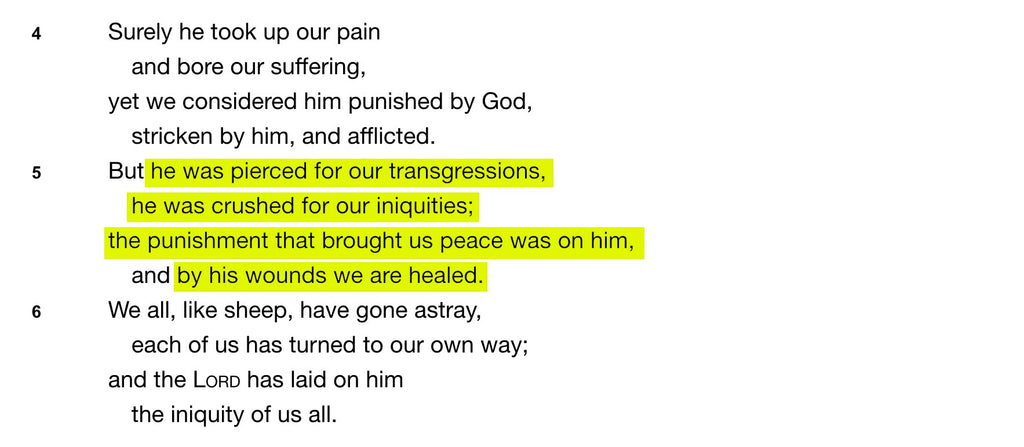
The Temple of God
Dr. Brown goes on further, as he ties in the temple of God, and Jesus' death and resurrection after that.
Very quickly, as we get into the different temples, let's just clarify some dates.
Solomon's temple (which is seen as the first temple) was built around 970 BC, and it was destroyed around 586 BC.
The second temple was started around 515 BC (although a very modest version), but then was overhauled into a much more magnificent structure during the reign of Herod the Great (between 37 BC and 4 BC).
This second temple (the one Jesus refers to in the gospels) was destroyed in AD 70.
Now, in 2 Chronicles 7, God says if Israel's sin reaches a certain level, He'll destroy the temple (the second temple), exile the people, and leave them in a state of judgment.
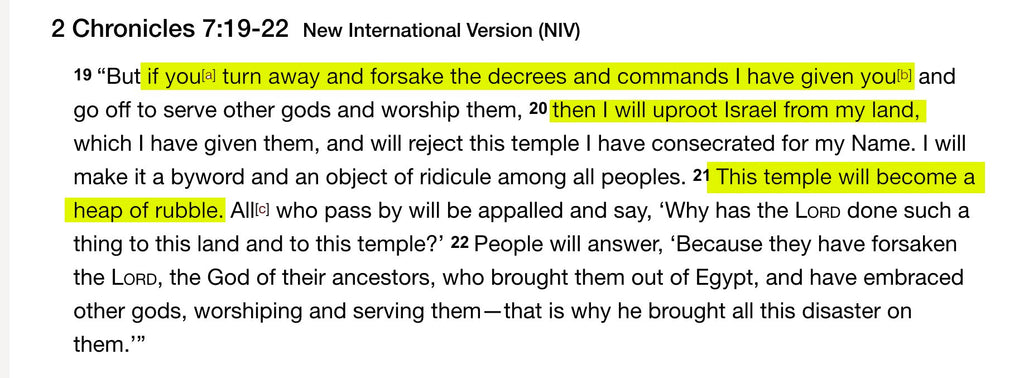
The prophet Daniel (living in the 6th century BC) prays in Daniel 9 that God would have mercy.
So God gives Daniel a revelation about the temple being rebuilt.
Before this new temple is destroyed, Daniel is told, several things are going to take place, including the bringing of everlasting atonement - the final dealing with sin.
Now Haggai (living in the 6th century BC as well) prophesied to the people of Jerusalem after they had returned from Babylon in 538 BC, and before they had rebuilt the temple in 515 BC.
Haggai said the glory of the second temple (which was destroyed in 70 AD) would be greater than the glory of the first temple, for God would fill the second temple with His glory.

Dr. Brown continues.
The Hebrew word for glory can sometimes refer to great wealth and abundance, but when God says he'll fill the temple with glory, that can only apply to his presence.
Then the prophet Malachi (who probably lived between around 500-400 BC) said the Lord will come to His temple, purifying some of His people and bringing judgment on others.
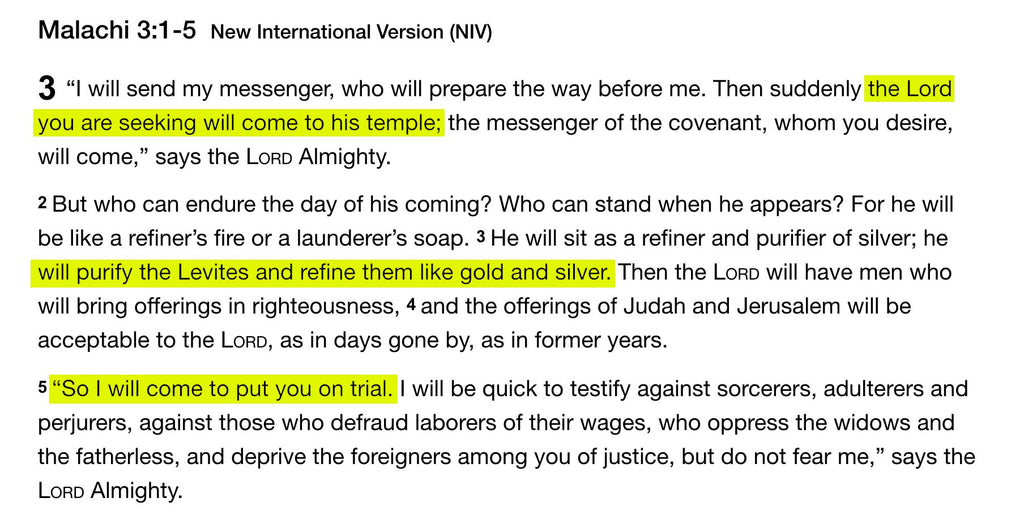
Malachi uses a Hebrew term that always refers to God Himself: the Lord - He will come to that temple.
Keep in mind, the second temple was destroyed in AD 70.
Atonement for sin had to be made and the divine visitation had to take place before the second temple was destroyed.
What Rabbinic Tradition Tells Us
There are even rabbinic traditions that put the Messiah's coming around two-thousand years ago - right when Jesus came.
In fact, Rashi (pictured above - who lived between around 1040 to 1105 AD), the foremost Jewish commentator on the Tanakh, put the date at more than 1,750 years ago, but that was based on the most famous chronological error in the rabbinic literature.
When this error is corrected, we find ourselves in the middle of the 1st century, within one generation of the time of Jesus!
Could There Be Another Messiah?
Dr. Brown presses the point a little harder now.
He states that it's not a matter of 'maybe there's another Messiah'.
If it's not Yeshua, which the Jewish name for Jesus, then throw out the Bible, because no one else but him accomplished what needed to be done prior to AD 70.
What divine visitation DID take place if not for Yeshua?
When else DID God visit the second temple in a personal way?
Who ELSE atoned for sin?
How else was the glory of the second temple greater than the first?
EITHER THE MESSIAH CAME 2000 YEARS AGO OR WE CAN DISCARD THE BIBLE.
Either Yeshua is the Messiah, or no one is.
Did Jesus Come As It Was Prophesied of Him?
The Talmud (the central text of rabbinic Judaism - pictured above) asks whether the Messiah will come 'with the clouds of heaven,' as written in Daniel 7:13, or 'gentle and riding on a donkey,' as in Zech. 9:9.
The answer is BOTH.
The Messiah Will Be Both Royal and Priestly
David is the prototype for the Messiah, and David performed certain priestly functions.

We are even told David's sons were priests.

Dr. Brown tells us to look at Psalm 110:4 for further confirmation.

Here we have the Lord making an emphatic oath that the king in Jerusalem was to be a priest forever in the order of the ancient priest-king of that city.
Either this prophecy directly refers to the Messiah or it refers to David.
If it refers to David, and he's the prototype of the Messiah, it still means the Messiah will be priestly as well as royal.
Dr. Brown goes on to sum it up.
We see in the scriptures that this messianic figure will be both priestly AND royal - he will deal with sin as well as rule and reign.
He will first suffer before he is raised up and exalted; he will both come riding on a donkey meek and lowly, as well as come in clouds of glory.
He will first be rejected by his people and will be a light to the nations.
He will suffer terribly for our sins as a righteous substitute.
The power of his deliverance from death will cause the ends of the earth to worship the one true God.
We also see that redemption had to come and there had to be divine visitation before the second temple was destroyed in AD 70.
Who could this person be if not Jesus?
Why Do We Think the Messiah Was to Be Divine?
Yeshua (written below in Hebrew) is the last great prophet who speaks to Israel.
Scriptures relating to the divinity of the Messiah are Psalm 110:1, Daniel 7, Isaiah 9:6, Psalm 45, and Isaiah 52:13.
Let's look at them.

So who is this other 'Lord' that the LORD is referring to, and why is he sitting at the RIGHT HAND OF GOD?
That's a position of great exaltation. It reminds me of Daniel 7:13-14.
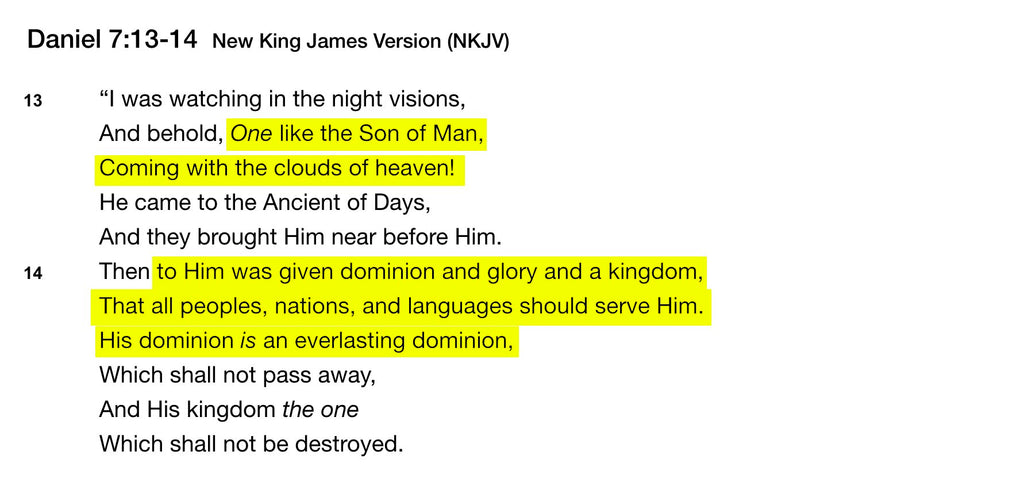
So here again, we see this 'Son of Man' who is seated at the right hand of God (just as noted in Psalm 110:1), who is given dominion and glory, that all people should serve (other translations say 'worship' him (as only Yahweh is deserving of)).
In Psalm 45 (a Messianic scripture), God is anointing the king, yet the king Himself is called "Elohim," a Hebrew name for God.

That 'O God' above is translated from the word, "Elohim".
We all know that sometimes "Elohim" can be a reference to earthly judges and angels, but to call an individual "Elohim" in this context is really stretching things.
Isaiah 52:13 says the servant will be 'raised' and 'lifted up'. In Isaiah, those words only occur in reference to the Lord.

And even more directly, in Isaiah 9:6-7, the king is given various names, including 'Mighty God' and 'Everlasting Father'.

So you have the royal king, or messianic figure, being described as divine.
The prophecies require certain events to happen - like atonement and the visit to the temple - before other events can happen, like the Messiah bringing peace to the earth.
The first act precedes the second act and prepares the way for it.
Again, these are not MY words, but Dr. Brown's words, from the book The Case For the Real Jesus.
First, atonement for sin, then peace on earth.
Why Do We Need a Sacrifice?
In reference to Jews' beliefs today of repentance, repentance has never existed independently from the larger system of atonement that God made.
Every time you find something in the Old Testament resembling the concept of repentance, you can find 50 to 100 that talk about the blood sacrifice.
What He wants is an obedient heart, yet because we all fall short, He established the sacrificial system to ultimately point people toward the Messiah.
According to some counts, the New Testament has over 400 allusions to the Book of Isaiah, and parts of 47 chapters of Isaiah's 66 are either directly quoted or alluded to in the New Testament.
This is second only to Psalms.
Is the Servant in Isaiah 53 the People of Israel?
References to the servant as a people (Is. 53) actually end with Is. 48:20.
The servant of the Lord is righteous and without guile and yet suffers terribly.
If this IS the nation of Israel, it is a complete violation of the Torah (the first 5 books of the Hebrew Bible).
According to the Torah, if the nation is righteous, then it will be blessed.
If it is wicked, it will be punished.
The idea that the nation as a whole could be righteous and yet punished is completely unacceptable on a scriptural level.
The second reason is because the text says the servant will be highly exalted, even to where kings stand in awe.
That's not true of Israel, but it is true of Yeshua, who's worshiped by kings and leaders around the world.
Third, the passage offers the picture of a totally righteous, guiltless servant of God
But nobody can point to a time when Israel, as a nation, had no deceit on its lips or was a righteous servant of God.
Hey, we ALL fall short of the glory of God (except Jesus).
Fourth, Isaiah says the servant's sufferings brought healing to the people.
Well, Jews have certainly suffered as much as any other people-group.
But Jewish sufferings did not bring healing to the nations that afflicted them.
There's an accumulation of words that are used (referring to the Messiah's dying).
He's 'stricken by God, he's smitten, he's pierced, he's crushed, he's oppressed, he's afflicted, he's led like a lamb to the slaughter, he's taken away, he's cut off from the land of the living, he's assigned a grave, he poured out his life unto death, he's with the rich in his death,' etc.
What are these phrases referring to, if not the fact that he did truly die?
Also, how does one die, and yet prolong his days, if not a resurrection?
Clearly, this passage speaks of the servant's continued activities after his death.
When the Hebrew scriptures speak of violence, which in Hebrew is 'hamas', it's describing illegal aggression like murder, bloodshed and robbery - none of which Yeshua ever committed.
Still Thirsty For More?
If you want to hear Dr. Brown go through some of these himself, check out the video below:
In Conclusion
Jesus (Yeshua) IS the Messiah.
Jesus fulfilled the prophecies that were written about Him hundreds of years before He walked the earth in flesh.
Now we want to hear from YOU.
Which objection to Jesus as the Messiah had you heard before? Was it that the people of Israel were actually the servant from Isaiah 53, or that the Messiah was never meant to be divine?
Let us know in the comments section below.

